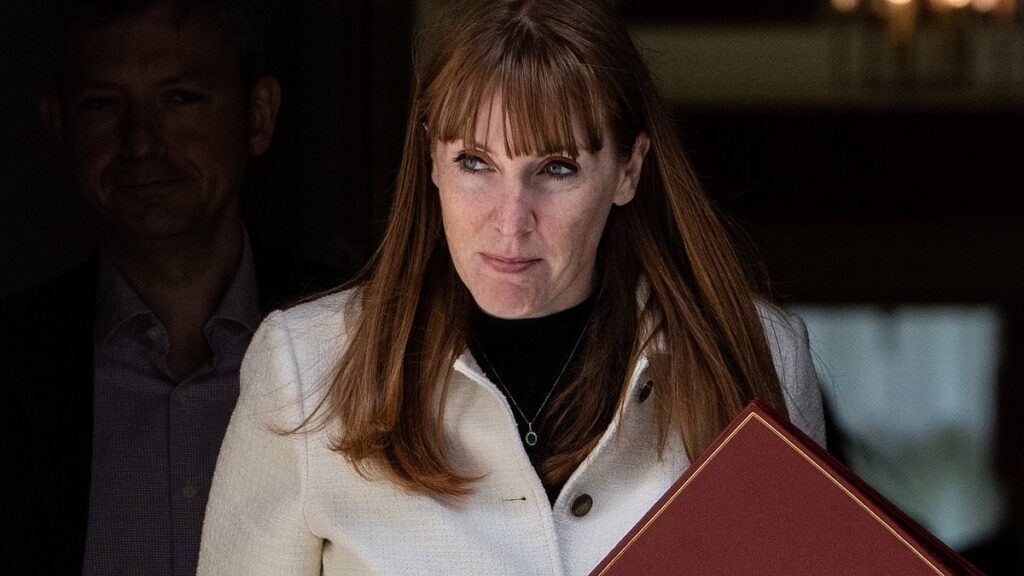Labour was yesterday accused of declaring ‘class war’ over plans to cut funding for town halls in the South and splurge it in its northern heartlands.
Under Angela Rayner’s shake-up, wealthier southern households face a raft of raids to help pay for the giveaway in Labour’s traditional working-class areas.
These include hikes in council tax bills and fees, such as parking, planning and licensing charges.
Town halls in the South also face having to cut existing services because of the raid on their coffers.
Under the plans, unveiled yesterday, town halls with ‘stronger council tax bases’, which tend to be in wealthier parts of London and the Home Counties, will get less Government cash.
Those with ‘weaker bases’, often in the North, will get more under the ‘progressive’ redistribution model.
The Deputy Prime Minister Ms Rayner, who is also the local government secretary, has long argued that an overhaul of council funding is needed.
Ms Rayner, the MP for Ashton-under-Lyne, has pointed to people living in the North who pay hundreds of pounds more in council tax than those in wealthier southern areas, calling it ‘unfair’.
Labour was yesterday accused of declaring ‘class war’ over plans to cut funding for town halls in the South and splurge it in its northern heartlands (Pictured: Angela Rayner)
Greg Smith, the Tory MP for Mid Buckinghamshire, said: ‘Anything that takes from the South to pay for the North is class war’
But the plans, which affect councils in England and would begin for three years from next April, sparked a furious backlash.
Greg Smith, the Tory MP for Mid Buckinghamshire, said: ‘We’re already massively over-taxed and council tax has already blown out of all proportion across the country.
‘Anything that takes from the South to pay for the North is class war.’
And Kevin Hollinrake, the Tories’ local government spokesman, said: ‘In reality, Labour’s appetite for tax hikes knows no bounds. These new backdoor rises in fees and charges are nothing more than stealth taxes – punishing the very councils that have kept taxes low and responsible.’
The new proposed formula for allocating money would take into account local needs, based on population, poverty and age data.
This will lead to more cash going to deprived areas. And Government grants, which account for about half of councils’ income, will now be based on calculations of what local authorities could raise if all areas charged the same rates of council tax based on their housing mix.
This will mean steep falls in grant income for wealthier councils. Vikki Slade, the Lib Dems’ local government spokesman, said: ‘It would be a big mistake for the Government to force councils into unfair council tax rises.
‘At a time when councils desperately need support, it beggars belief that Angela Rayner is considering reducing funding entitlements for many, including councils which already receive very little grant funding.’
rime Minister Keir Starmer and Deputy Prime Minister Angela Rayner make a visit to a construction site on December 12 last year
Kevin Hollinrake, the Tories’ local government spokesman, said: ‘In reality, Labour’s appetite for tax hikes knows no bounds’
But ministers insist councils won’t go bust as it would be phased in over three years, removing a potential ‘cliff edge’ if the redistribution happened in one go.
They also say it will not lead to huge council tax hikes because these are already capped at 5 per cent, and most councils already raise it by this amount every year.
However, they could apply to Ms Rayner, who is from Stockport, for special permission to raise it by more than this given the unprecedented pressure their finances could come under.
They are also likely to look at cutting back on existing services and hiking other fees to help balance the books.
It raises the prospect of councils being handed more powers to raise revenues by hiking such fees.
Yesterday’s new consultation, which will run until August 15, said ministers will now ‘review all fees previously identified and consider where there is the strongest case for reform’.
Kate Ogden, a senior research economist at the Institute for Fiscal Studies, said councils in ‘leafier suburban and rural areas’ in the South will be among the biggest losers.
Local government minister Jim McMahon said: ‘There’s broad agreement across council leaders, experts, and parliamentarians that the current funding model is broken and unfair.
‘This Government is stepping up to deliver the fairer system promised in the 2017 Fair Funding Review but never delivered.’
